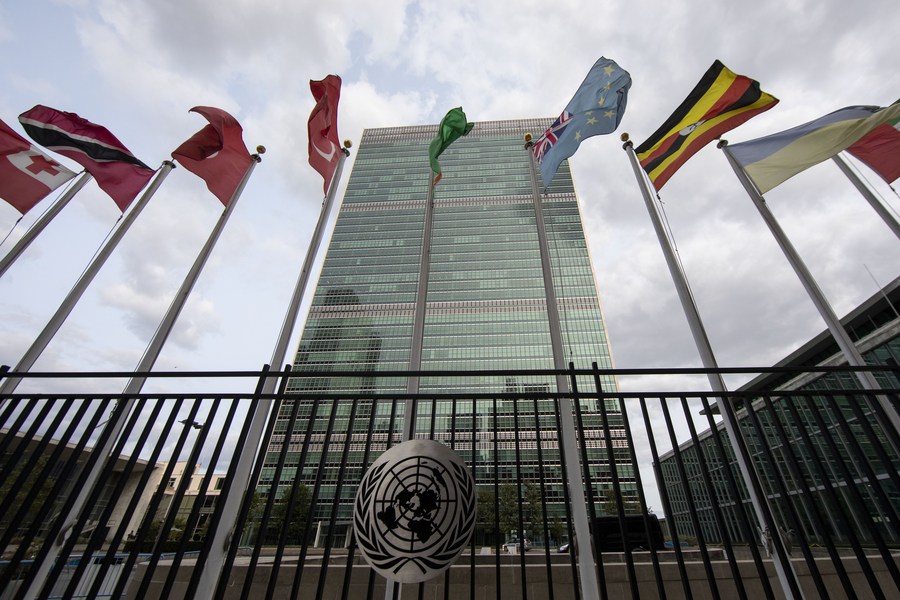China's multilateralism stance praised
By Liu Yinmeng in Los Angeles | China Daily Global | Updated: 2020-09-24 09:28

Nation's commitment to cooperation means benefits shared, experts say
Multilateralism, the basis of the United Nations charter, is under pressure from protectionism and unilateralism. Despite the different voices being expressed in the international arena, China's steadfast commitment to multilateralism has enabled the country to provide economic opportunities for itself and other nations, experts said.
"In today's world, the real conflict should not be between opposing political systems but rather between the forces of modernity, competence and development on the one hand, and those of ignorance, exploitation and oppression on the other. China can make its engagement with global diplomacy celebrated," said Robert Kuhn, a leading China expert and chairman of The Kuhn Foundation in the US.
Gedion Jalata, a veteran senior adviser to the UN Development Programme's South-South Cooperation, said that if one looks at the foreign policy principles of China, they are pretty much directed toward promoting multilateralism.
"China is working with African countries … in terms of foreign direct investment, in terms of trade, in terms of government assistance. China is also working with European countries as well as the Latin American countries," said Ethiopia-based Jalata, who is also a former consultant to the UN Economic Commission for Africa.
"You can witness this if you see the trade partnerships of China with the rest of the world … as well as political engagement of China."
China viewed Africa as an opportunity, Jalata said. He pointed to the Forum on China-Africa Cooperation, a platform that has been bringing together African and Chinese leaders to enhance dialogue and economic collaboration since 2000.
"Many of our traders are going to China to bring goods to Africa; an airplane flies daily to Beijing, Shanghai, Guangzhou, Chengdu. This shows the magnitude of the trade partnerships between Africa and China," Jalata said.
In a recent international online conference organized by the Schiller Institute, Helga Zepp-LaRouche, the organization's founder and president, praised China's commitment to explore opportunities to increase multinational collaboration through the Belt and Road Initiative.
"What that spirit signifies was the concrete perspective of the developing countries for the first time to overcome underdevelopment," Zepp-LaRouche said.
"There was the possibility to overcome geopolitics by putting a win-win cooperation among sovereign nation states on the table."
She said China has respect for different social systems and practices noninterference in the internal affairs of other countries.
Confucian philosophies
At the forum, Marcelo Munoz, founder and president emeritus of Catedra China and the chairman of Spanish Businessmen in China, suggested that China's economic policy, which emphasizes collectivism, is rooted in Confucian philosophies. This contrasts with the Western model, which places greater value on individualism.
"I've learned from China to look at the world, not from the standpoint of each village, not from the standpoint of each situation, but from the breadth of view, which is required when taking up those global issues," said Munoz, who has had more than 40 years' experience in China.
"That is the path that has to be taken, and that is the only way to reach a solution. Without hate, without resentment, without the idea of confrontation, we actually had to have what is properly called a 'dialogue of cultures' in the Greek sense of the word, a discussion of different points of view."
The world today is facing unprecedented challenges such as climate change, terrorism, trade barriers, poverty, inequality and the COVID-19 pandemic; these problems call for collaboration, experts noted.
Kuhn sees tackling those challenges as potential avenues for collaboration between the US and China.
"What is worth remembering about US-China cooperation in fighting Japanese aggression in World War II is that, at the time, the interests of the US and China differed, yet they still cooperated, united by a common foe," he said.
"What's the solution to US-China conflict today? If common foes are what we need, the US and China have common foes in abundance. They are not marching soldiers, but they are every bit as dangerous and deadly: pandemics, climate change, world poverty, world inequalities, terrorism, organized crime, wars and threats of war in numerous locations," he said. "In this context, a community of a shared future for humanity can thrive."
Kuhn said the so-called "China threat" that many Westerners are worried about can only be real if many foreigners believe it to be real.
Kuhn cited comments Chinese President Xi Jinping made several years ago in which the president articulated that China's strategic objectives and principal tasks of foreign affairs include the need to safeguard the country's core interests and craft a conducive international environment.
He said Xi stressed the importance of major country diplomacy in an increasingly multipolar world, with China fostering partnerships with nations throughout the world.
























